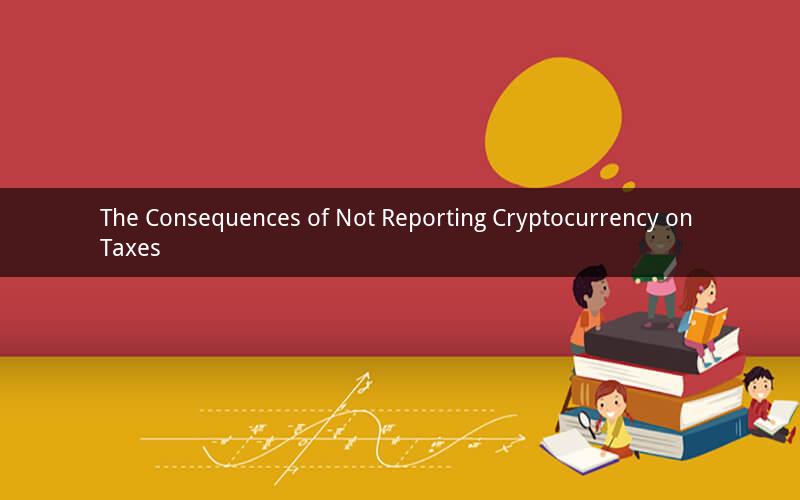
Introduction:
Cryptocurrency has become a popular investment and transaction medium in recent years. However, it is crucial for individuals and businesses to report their cryptocurrency activities accurately on their taxes. Failing to do so can lead to severe consequences. In this article, we will explore what happens if you don't report crypto on taxes, including potential penalties, legal implications, and tips for compliance.
1. Penalties for Not Reporting Cryptocurrency on Taxes
When individuals or businesses fail to report cryptocurrency on their taxes, they may face substantial penalties. Here are some of the consequences:
a. Failure to File Penalties: The IRS imposes penalties for failing to file a tax return. The penalty is typically 5% of the unpaid tax for each month the return is late, up to a maximum of 25% of the unpaid tax.
b. Failure to Pay Penalties: If you fail to pay your taxes on time, the IRS may impose a penalty of 0.5% of the unpaid tax for each month or part of the month the tax remains unpaid, up to a maximum of 25%.
c. Accuracy-Related Penalties: If the IRS determines that your failure to report cryptocurrency was due to negligence or intentional disregard for tax laws, you may be subject to accuracy-related penalties. These penalties can be as high as 20% to 40% of the underpaid tax.
2. Legal Implications
Not reporting cryptocurrency on taxes can lead to legal implications, including audits, investigations, and even criminal charges. Here are some potential legal consequences:
a. Audits: The IRS may audit your tax returns if they suspect you have failed to report cryptocurrency. During an audit, the IRS will scrutinize your financial records and may impose additional penalties if they find discrepancies.
b. Investigations: In some cases, the IRS may initiate an investigation into your cryptocurrency activities. This can involve extensive inquiries and may lead to civil or criminal charges.
c. Criminal Charges: If the IRS determines that you intentionally evaded taxes by not reporting cryptocurrency, you may face criminal charges, including fraud and tax evasion. These charges can result in fines, imprisonment, and a damaged reputation.
3. Tips for Compliance
To avoid the consequences of not reporting cryptocurrency on taxes, it is essential to follow these tips for compliance:
a. Keep Accurate Records: Maintain detailed records of all cryptocurrency transactions, including purchases, sales, and exchanges. This will help you accurately report your cryptocurrency activities on your tax return.
b. Understand Tax Laws: Familiarize yourself with the tax laws and regulations regarding cryptocurrency. This will help you ensure that you are reporting your cryptocurrency activities correctly.
c. Report All Income: Report all cryptocurrency income, including gains from selling or exchanging cryptocurrency, interest, dividends, and any other forms of income generated from cryptocurrency investments.
d. Use Tax Software or Seek Professional Help: Consider using tax software or seeking professional help to ensure that you are reporting your cryptocurrency activities accurately.
e. File an Amended Return: If you have previously failed to report cryptocurrency on your taxes, file an amended return to correct the error. This will help you avoid potential penalties and legal implications.
Conclusion:
Not reporting cryptocurrency on taxes can have severe consequences, including penalties, legal implications, and a damaged reputation. To avoid these consequences, it is crucial to keep accurate records, understand tax laws, and report all cryptocurrency income. By taking these steps, you can ensure compliance and avoid the potential pitfalls of not reporting cryptocurrency on taxes.
Questions and Answers:
1. Q: What is the maximum penalty for failing to file a tax return?
A: The maximum penalty for failing to file a tax return is 25% of the unpaid tax.
2. Q: Can the IRS impose civil penalties for not reporting cryptocurrency on taxes?
A: Yes, the IRS can impose civil penalties, including failure to file and failure to pay penalties, as well as accuracy-related penalties.
3. Q: What are the potential criminal charges for not reporting cryptocurrency on taxes?
A: The potential criminal charges include fraud and tax evasion, which can result in fines, imprisonment, and a damaged reputation.
4. Q: How can I ensure that I am reporting cryptocurrency activities accurately on my taxes?
A: To ensure accuracy, keep detailed records of all cryptocurrency transactions, understand tax laws, report all income, use tax software or seek professional help, and file an amended return if necessary.
5. Q: Can I avoid penalties if I discover I failed to report cryptocurrency on my taxes?
A: Yes, you can avoid penalties by voluntarily coming forward and correcting the error. The IRS offers an opportunity to disclose unreported cryptocurrency through its voluntary disclosure program.